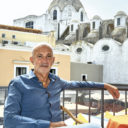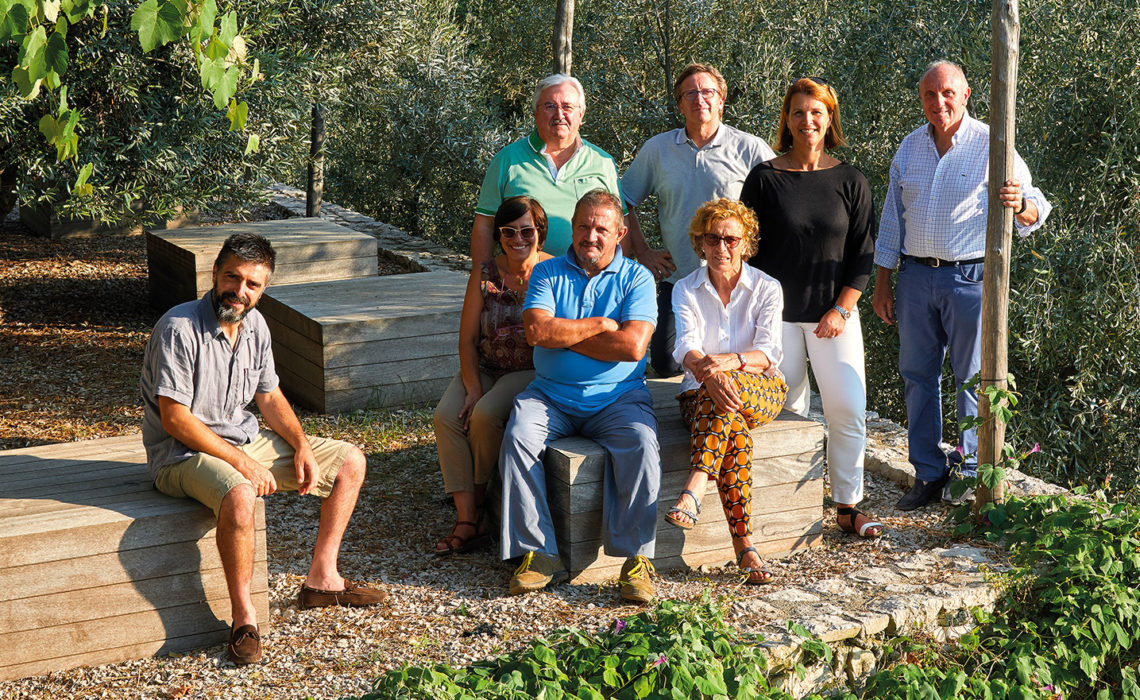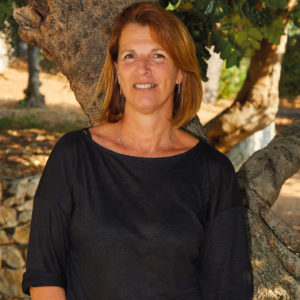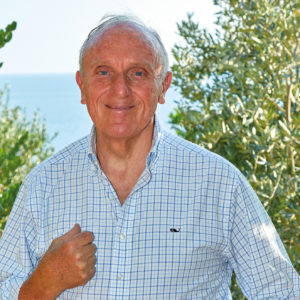L’Oro di Capri non è soltanto produzione di olio extravergine d’oliva dagli ulivi secolari di Anacapri. Nelle piccole bottiglie dell’Associazione c’è molto di più: storia, futuro, un modello di sostenibilità. “È la riscoperta di un legame”, ci spiega Maria Luisa Della Femina. Per lei è un tuffo in una tradizione familiare che si svolgeva sui 5000 ettari di terreno nella zona di Pino, verso il Faro: “Da bambina partecipavo alla raccolta delle olive, la nonna aveva grandi fondi coltivati a uliveti e tutti in famiglia partecipavamo”. Sono passati i decenni e aree come quelle sono state spesso abbandonate, “macchie informi di paesaggio”, le definisce Maria Luisa. La riscoperta di questi ultimi anni ha ridato forza a usanze antiche e ha aggiunto consapevolezza e conoscenza: attraverso l’Associazione si entra in contatto con gli agronomi, si fanno corsi di degustazione, si approfondiscono le proprietà organolettiche dell’olio.
L’Oro di Capri è spesso così: la storia di un ritorno alla terra. “Innanzitutto mi ha spinto la curiosità”, racconta Marco Pisanzio, un altro produttore: in breve tempo la curiosità per i suoi stessi uliveti alla Guardia è diventata passione. “Stare a contatto con la natura mi giova, mi consente di ricaricarmi dallo stress lavorativo quotidiano”. Le terre di Antonino De Turris si trovano tra via Faro e la Fabbrica e raccontano un’altra storia di dialogo con una lunga vicenda familiare: “Qualche amico”, confida De Turris “mi ha detto che siamo nostalgici e che inseguiamo un’iniziativa antieconomica. Per me, invece, ha significato riprendere una passione che deriva dai miei genitori, in una chiave di modernità e con un rigore scientifico. L’Oro di Capri è indole e vocazione”.
In quell’indole c’è anche un’immagine chiara sul futuro dell’isola nella sua totalità, come spiega Marco Di Stefano: “Capri vive di turismo, ma il turismo non è un comparto a sè stante: il successo di una località è dato da un insieme di fattori che ne definiscono l’unicità, di questi il più evidente è il paesaggio”. E avere cura del paesaggio, prosegue Di Stefano, significa anche occuparsi di “energia, trasporti, gestione delle risorse idriche, traffico, smaltimento dei rifiuti, mobilità elettrica, trovare alternative al trasporto delle merci su ruota, regolare i flussi turistici ed evitare omologazione e appiattimento”. L’agricoltura, la più antica delle vocazioni di Anacapri, può insomma essere la risposta a domande decisamente più contemporanee su come vivere in modo sostenibile su un’isola come Capri negli anni a venire.
“L’olio è solo l’ultimo tassello di una catena che mette al centro l’ambiente”, spiega Vincenzo Torelli, “è uno strumento per far sì che si trovi un modo per salvaguardare i terreni dell’isola, in particolare della fascia costiera di Anacapri, e nello stesso tempo lanciare un messaggio che guarda in avanti. Tramite l’Oro di Capri si è messo in moto un sistema virtuoso che ci fornisce un metodo per salvaguardare il futuro”. Nella piccola produzione locale dell’Oro di Capri c’è una visione a lungo termine: “Ci troviamo davanti a un limite, un punto di non ritorno. Prima poteva sembrare astratto, oggi stiamo toccando con mano cosa significa l’uso intensivo delle risorse naturalistiche. Noi imprenditori dobbiamo per primi mettere in moto una logica d’impresa più attenta alla natura, con l’obiettivo di creare sostenibilità”.
Questa strada sarebbe un vicolo cieco se riguardasse solo imprenditori e proprietari di terre, per questo il lavoro più importante da fare è con i ragazzi, per costruire e rendere più solido il loro legame con la terra che abitano: “Un aspetto dell’opera dell’Associazione che mi sta a cuore è indurre i giovani al rispetto della natura e alla cura della campagna, con seminari e passeggiate negli uliveti dal Faro sino alla Grotta Azzurra”, spiega Rodolfo Padovani. Gli ulivi sono, per usare le parole di Luisa Maresca, “una ricchezza da salvaguardare”, non solo per il paesaggio, ma “per la comunità intera”. In quella comunità ci sono anche i suoi tre figli: “Come tanti giovani, si interessano poco alla terra, ma l’idea di fare un prodotto di qualità e magari commercializzarlo intelligentemente potrebbe avvicinarli”. A quanto pare, lentamente, anche questo sta funzionando. “Mi fa piacere constatare che di recente i miei figli abbiano iniziato a interessarsi alla pulizia e al monitoraggio dei terreni”. Il futuro dell’Oro di Capri passa anche da loro.
Sulla medesima linea d’onda è lo stesso presidente dell’Associazione, Pierluigi Della Femina, che ha dichiarato: “Uno dei fattori che più mi riempie d’orgoglio dell’Associazione è la sempre più entusiastica partecipazione dei ragazzi delle scuole alle nostre attività, educare i giovani al rispetto della natura significa avere una speranza per il domani, in questo modo il nostro sforzo non sarà mai stato vano”. Emblematico in tal senso è proprio uno degli ultimi riconoscimenti ricevuti dall’Associazione: “Il Magnifico Special Award – Save the Landscape”, assegnato lo scorso Marzo, presso le Cantine Antinori, a San Casciano (Firenze), da Matia Barciulli e Caterina Mazzocolin, fondatrice del blog Olissea, media partner della manifestazione, che promuove la diffusione della cultura dell’olio extravergine d’oliva.
Sustainability: a bond between history and the future
Mariano Della Corte
Oro di Capri is not simply the production of extra virgin olive oil from the centuries-old olive trees of Anacapri. In the little bottles of the Organization there is much more: history, future, a model of sustainably. “It is the rediscovery of a connection”, tells us Maria Luisa Della Femina. For her, it is a leap in a family tradition around the five thousand hectares of land in the Pino area, towards the Lighthouse: “When I was a child, I took part in the olive harvest, my grandmother owned large fields cultivated with olive groves and everyone in the family took part”. Decades have passed and areas such as those have often been abandoned, “shapeless scrubs of landscapes”, describes them Maria Luisa. The rediscovery of the recent years gave back strength to old customs and added awareness and knowledge: thanks to the Organization you can get in touch with agronomists, take tasting classes, study the organoleptic properties of olive oil.
Oro di Capri is often this: the story of a return to the land. “First of all, I’ve been driven by the curiosity”, tells Marco Pisanzio, another producer: in a short time, the curiosity for his own olive groves in the Guardia area has become a passion. “Being in contact with nature allows me to recharge from the daily working stress”. The fields of Antonino De Turris are located between via Faro and the Fabbrica and tell another story of dialogue with a long family history: “Some friends of mine”, De Turris confides to us “have told me that we are nostalgic, and we pursue an antieconomic initiative. For me, instead, it means recovering a passion I inherited from my parents, in a modern key and with scientific rigor. Oro di Capri is an inclination and a calling”.
In this inclination there is also a clear image on the future of the island in its entirety, as Marco Di Stefano explains to us: “Capri thrives mainly on tourism, yet tourism is not an independent sector: the success of a location is given by a combination of factors that define its uniqueness, and among them the most evident is the landscape”. And taking care of the landscape, Di Stefano continues, also means dealing with “energy, transportations, the management of water resources, traffic, wastes disposal, electric mobility, finding alternatives for the wheeled transport of goods, regulating the tourist flows and avoiding homogenization and banalization”. Agriculture, the oldest vocation of Anacapri, could therefore be the answer to certainly contemporary questions on how to live sustainably on an island such as Capri in the following years.
“The oil is just the last ring in a chain that puts the environment at the center”, explains Vincenzo Torelli, “it is an instrument to find a way to protect the island’s environment, particularly the coastline of Anacapri, and at the same time to send a message looking at the future. Thanks to Oro di Capri we have put into motion a virtuous system that provides a way to protect the future”. In the small local production of Oro di Capri there is a long-term vision: “We find ourselves before an edge, a point of no return. In the past it could have seemed abstract, today we are experiencing first-hand what the extensive exploitation of natural resources means. We entrepreneurs must be the first to start up a business logic that is more careful towards nature, with the goal to create sustainability”.
This road would be a dead end, if it concerned only entrepreneurs and landowners, and for this reason the most important work has to be done with our children, to build a relationship with the land they live and make it stronger: “An important aspect of the Organization is the education of young people towards the respect of nature and the cure of the countryside, promoting seminars and walks in the olive groves from the Lightouse all the way to the Grotta Azzurra”, explains Rodolfo Padovani. The olive trees are, to use the words of Luisa Maresca, “an asset to protect”, not only for the landscape, but “for the entire community”. In that community there are also her three children: “Like many other young people, they are not very interested in the land, but the idea of creating a high-quality product and, why not, cleverly selling it, could attract them”. It looks like this is slowly working. “I’m happy to see that, recently, even my children have been interested in the maintenance and monitoring of the fields”. The future of Oro di Capri rests on their shoulders as well.
On the same wavelength is the very president of the Organization, Pierluigi Della Femina, who told us: “One of the elements that makes me proud of the Organization is the increasing participation of students in our activities; educating the new generation towards the respect of nature represents a hope for the future, this way our efforts will never be in vain”.
Emblematic in this sense is one of the latest awards received by the Organization: “Il Magnifico Special Award – Save the Landscape”, received last March, at the Cantine Antinori, in San Casciano (Florence), by Matia Barciulli and Caterina Mazzocolin, founder of the Olissea blog, media partner of the event, promoting the spread of culture on extra virgin olive oil.









No Comments